Speakers
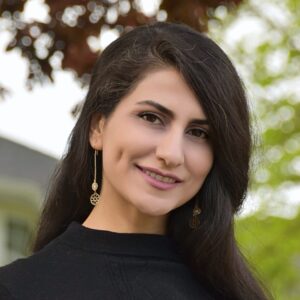
Shekoofeh Azizi
Google Deepmind
Shekoofeh Azizi is a senior research scientist at Google Deepmind and she completed her Ph.D. at the University of British Columbia (UBC), Vancouver, Canada in 2018. Her research concentrated on developing simple and efficient machine learning algorithms that are broadly applicable to a range of computer vision applications. Specifically, over the past few years, she has been focused on developing methods to accelerate the translation of AI solutions to clinical impact. Her work has been covered in various media outlets and recognized by multiple awards including the Governor General’s Canada Academic Gold Medal for her contribution in improving diagnostic ultrasound.
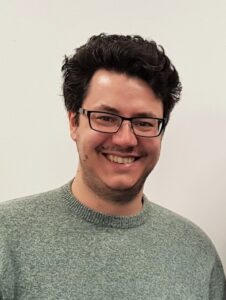
Christos Bergeles
King’s College London
Christos Bergeles is a Reader (Associate Professor) of Surgical Robotics at the School of Biomedical Engineering & Imaging Sciences of King’s College London. He received his Ph.D. degree in Robotics from ETH Zurich, Switzerland, in 20112. He was a postdoctoral research fellow at Boston Children’s Hospital, Harvard Medical School, Massachusetts, and the Hamlyn Centre for Robotic Surgery, Imperial College, United Kingdom. He is leading the Robotics and Vision in Medicine Lab, and is Deputy Director for the Manufacturing of Advanced Implants and Surgical Instruments facility.
His research interests include micro-surgical robotics and interventional visual servoing. Specifically, with his team they are exploring ways to develop image-guided micro-precise instruments and multi-sensory guidance algorithms to achieve impossible interventions and regenerative therapies deep inside the human body. He has held an ERC Starting Grant, and translational research funding from the National Institutes from Health Research. He is currently holding an EIC Pathfinder and ERC Proof of Concept grant. He is an IEEE Senior Member.
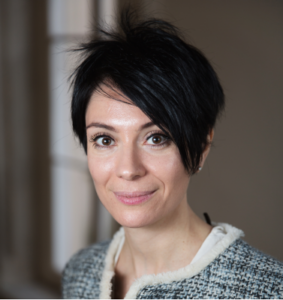
Stamatia Giannarou
Imperial College London
Dr. Stamatia (Matina) Giannarou is a Senior Lecturer in Surgical Cancer Technology and Imaging at the Department of Surgery and Cancer, Imperial College London, UK. She holds a Royal Society University Research Fellowship, and she is leading the Cognitive Vision in Robotic Surgery research group at the Hamlyn Centre for Robotic Surgery. Her work focuses on developing computer vision and Artificial Intelligence techniques for intraoperative surgical navigation and tissue characterisation during robot-assisted operations. Her research has been published at high impact journals and has received international awards. She has attracted funding from the Royal Society, EPSRC, CRUK and NIHR. She is a regular reviewer for high impact journals and conferences in the fields of medical robotics and imaging, and the chair of the annual Hamlyn Winter School on Surgical Imaging and Vision.
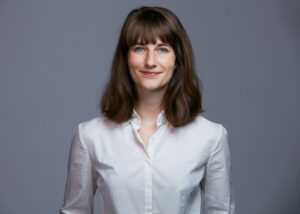
Konstanze Möller-Jansen
TU Dresden - Cluster of Excellence CeTI
After completing a bachelor’s degree at TU Dresden and Ca’ Foscari Venezia in Business and Economics (B.Sc.) Konstanze Möller-Jansen studied Philosophy at the Humboldt-Universität zu Berlin (B.A.) and Freie Universität Berlin (M.A). Her research focus in political philosophy is on themes such as (structural) domination, freedom, and philosophy of technology. She is currently working on her dissertation topic: “The impact of algorithmic rule – a normative evaluation from the perspective of freedom as non-domination”.
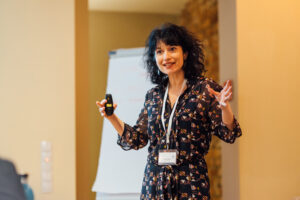
Stefanie Speidel
National Center for Tumor Diseases - Cluster of Excellence CeTI - SECAI
Stefanie Speidel is a full professor for “Translational Surgical Oncology” and director at the National Center for Tumor Diseases (NCT/UCC) Dresden since 2017 as well as one of the co-speakers of the DFG Cluster of Excellence CeTI since 2019 and the Konrad Zuse AI school SECAI since 2022. She received her PhD from Karlsruhe Institute of Technology (KIT) with distinction in 2009 and had a junior research group “Computer-Assisted Surgery” from 2012 – 2016 at KIT. She is an elected board member of the Medical Image Computing and Computer Assisted Interventions (MICCAI) society and an appointed member of Rat für Informationsinfrastrukturen (RfII). She has been (co)-authoring more than 130 publications and regularly organizes workshops and challenges including the Endoscopic Vision Challenge@MICCAI and the Surgical Data Science workshop. She has been general chair and program chair for a number of international events including the International Conference on Information Processing in Computer Assisted Interventions (IPCAI) and MICCAI conference. Her current research interests include machine learning for image- and robot-assisted surgery, data-driven surgical training and context-aware human-machine collaboration in the future sensor operating room.
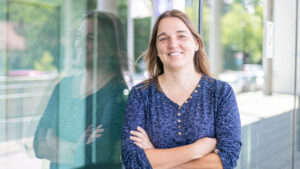
Anna Poetsch
BIOTEC
Anna Poetsch moved to Dresden in July 2020. She spent her postdoctoral time at the Francis Crick Institute with a placement to the Okinawa Institute of Science and Technology (OIST).
She did her PhD at the German Cancer Research Institute (DKFZ) and undergraduate training at University Konstanz, the Japanese National Cancer Center Research Institute, and ALTANA Pharma AG.
Anna’s background is in classical biochemistry/ molecular biology, DNA damage response, and mutations in cancer. Her interest in the associated processes has not changed, but the methodology has become increasingly computational, deeper and deeper into deep learning.
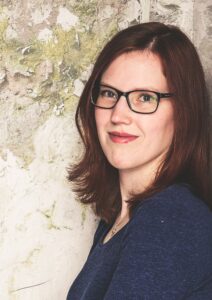
Annika Reinke
German Cancer Research Center
Annika Reinke did her Ph.D. at the division of Intelligent Medical Systems at the German Cancer Research Center (DKFZ) with the goal of adapting mathematical concepts to societally relevant topics, like scientific benchmarking and validation. Having published disruptive findings on biomedical image analysis challenges in Nature Communications, she is a founding member of the initiative of Biomedical Image Analysis ChallengeS (BIAS) aiming for bringing biomedical image analysis challenges to the next level of quality. She serves as the secretary of the MICCAI special interest group on biomedical challenges and as an active member and taskforce lead of the MONAI working group on evaluation, reproducibility and benchmarking.
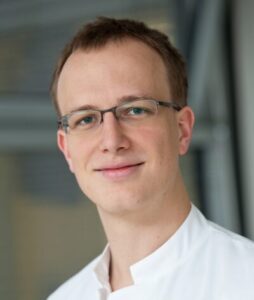
Martin Wagner
University Hospital Carl Gustav Carus - Cluster of Excellence CeTI
Martin Wagner is an attending surgeon of visceral surgery and full professor of AI-based assistance systems in surgery at University Hospital Carl Gustav Carus and the Cluster of Excellence Tactile Internet with Human in the loop (CeTI) at Technische Universität Dresden. With his interdisciplinary research group and cooperation partner in academia and industry, he aims at bringing new technologies into the operating room to assist the surgical team and improve surgical treatment for patients with cancer. This includes research on co-operation with cognitive surgical robots by means of multi-sensor-environments, task-automation, mixed reality, and tactile internet, as well as the measurement of surgical quality in cancer surgery by means of Surgomics and improvement of that quality by means of personalized process assistance.
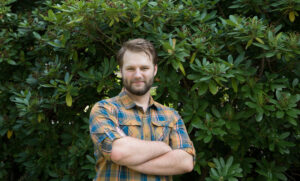
Gregory Patrick Veldhuizen
Else Kröner Fresenius Center for Digital Health
Dr. Gregory Patrick Veldhuizen, MD PhD, is a physician-scientist specializing in AI applications in medicine. After completing his medical degrees at Maastricht University and a PhD at the Cardiovascular Research Institute Maastricht, he worked at RWTH Aachen as an AI Physician-Scientist. In 2022, Dr. Veldhuizen became a founding member of the Else Kröner Fresenius Centre for Digital Health at Dresden University of Technology, where he currently focuses on AI applications for clinical diagnostics, prognostics, and treatment response. Throughout his career, he has published numerous research articles, presented at international conferences, and contributed to the development of innovative AI-based medical solutions.
Workshops
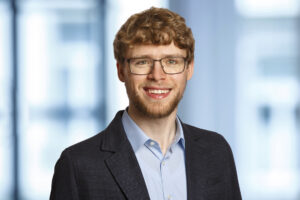
Simon Warsinsky
Karlsruhe Institute of Technology
Simon Warsinsky is a research associate at the Institute of Applied Informatics and Formal Description Methods (AIFB) of the Karlsruhe Institute of Technology (KIT), as well as doctoral researcher in the Helmholtz Information and Data Science School for Health (HIDSS4Health). He received his master’s degree in Information Systems from KIT in 2021. His research interests include gamification, health behavior change and expert data annotation tasks. Currently, he is researching the design of successful gamification concepts for medical image annotation tasks.
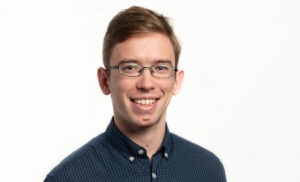
Peter Steiner
TU Dresden
Peter Steiner received the master’s (Dipl.Ing.) degree from TU Dresden, Dresden, Germany, in 2017, where he is currently pursuing the Ph.D. degree with the Institute of Acoustics and Speech Communication. His research interests include signal processing,
machine learning, and its application to different kinds of audio, visual, and multisensor signals. He is in particular working with reservoir computing and is thereby interested in improving these techniques using unsupervised learning methods.
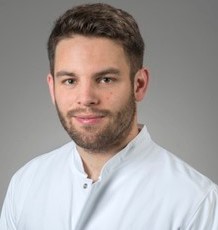
Felix von Bechtolsheim
University Hospital Carl Gustav Carus, Dresden, CeTI
Felix is a surgery resident and clinician scientist since 2017 at the department of visceral, thoracic and vascular surgery at the university hospital Carl Gustav Carus in Dresden. Since then, he has taken over the management of the training course for minimally invasive surgery together with PD Florian Oehme, MD, and has significantly strengthened the corresponding teaching and research activities. He is a research member at CeTI since 2019. In 2022, he was appointed co-leader of the Education and Training Taskforce of the CTAC Section (Computer and Telematic-assistierte Chirurgie) of the German Society of Surgery. His research focus and the subject of most of his publications is minimally invasive surgery and surgical education.
